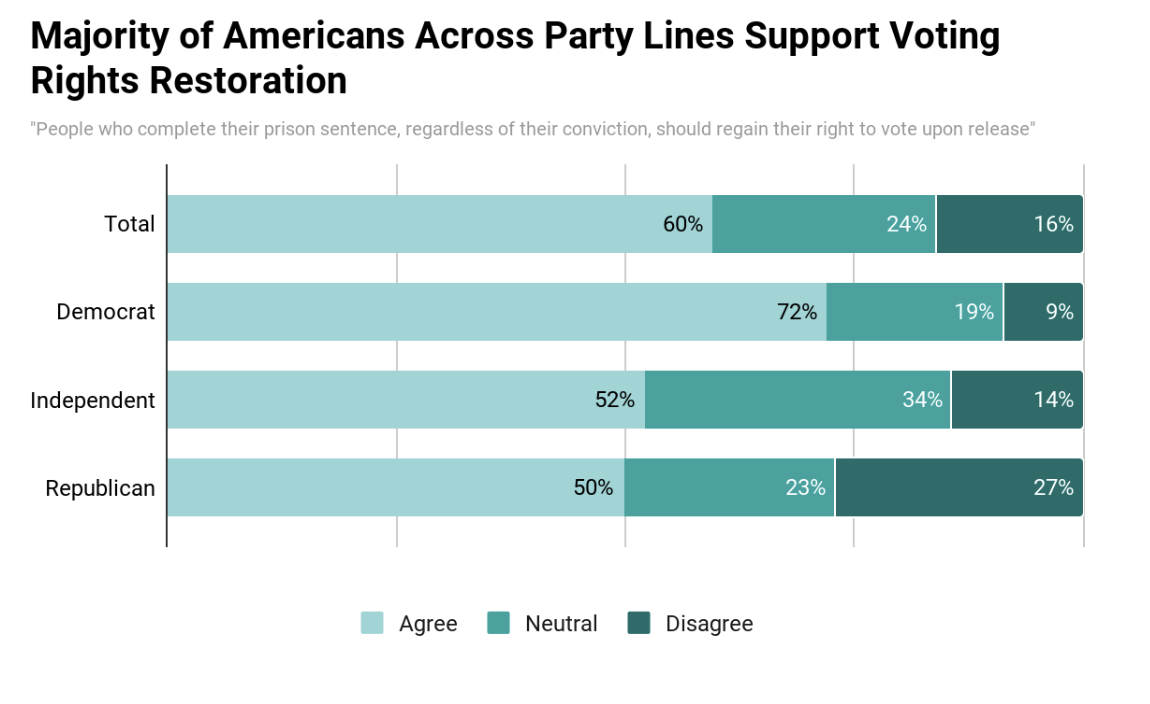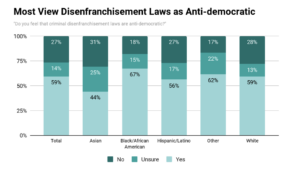Bipartisan Support for Restoring Voting Rights to Former Felons April 30, 2024
In recognition of Second Chance Month—a nationwide effort to promote reentry and increase awareness of the challenges the roughly one in three adults with criminal records in the US face—we looked further into Americans’ attitudes towards voting rights reforms aimed at increasing voting access.

Written by Lily Stockbridge
As coverage of the 2024 election continues to dominate the news cycle, an estimated 4.4 million Americans, or 2% of the voting population, are ineligible to vote due to current or previous felony convictions. Disenfranchisement laws, the legal act of removing one’s right to vote based on a criminal conviction, disproportionately impact Black Americans. As of 2022, 48 states have some form of limitation on the voting rights of those convicted with a felony, with 11 states permanently removing the right to vote upon release and completion of parole and/or probation according to a 2022 report from The Sentencing Project.
In recognition of Second Chance Month—a nationwide effort to promote reentry and increase awareness of the challenges the roughly one in three adults with criminal records in the US face—we looked further into Americans’ attitudes towards voting rights reforms aimed at increasing voting access.
Restoring voting rights has bipartisan support
Citizen Data’s recent nationally representative survey shows strong public support for formerly incarcerated individuals regaining their right to vote. Six out of ten (60%) Americans agree that people who complete their prison sentence, regardless of their conviction, should regain their right to vote upon release. Additionally, this sentiment is held across political party identification:

Americans View Disenfranchisement Laws As Anti-democratic
A significant portion of Americans (59%) feel that criminal disenfranchisement laws (defined for respondents as “the act of barring people to vote based on previous criminal convictions”) are anti-democratic. Black Americans were the most likely (67%) to indicate these laws are anti-democratic. Historically, criminal disenfranchisement has targeted Black Americans as disenfranchisement laws were enacted in many states in the post-Civil War period, the consequences of which are still felt today: a 2022 estimate shows that one in 19 Black Americans are disenfranchised in America.
Notably, Asian Americans are the least likely to view these laws as anti-democratic. The data surrounding Asian Americans’ attitudes about criminal justice, both by those directly impacted by it and general population opinions, is lacking revealing a concerning research gap. Despite making up around 4% of the US voting population, Asian Americans are less represented in the criminal justice system—comprising only 1% of the federal and state prison population. Given that their community experiences comparatively lower levels of impact compared to other racial and ethnic groups, they may potentially perceive themselves as less directly affected by criminal justice reform matters. By contrast, Black Americans are about 12% of the voting population but 32% of the prison population in 2022.
Hispanic/Latino Americans are also less likely than the average to view these laws as anti-democratic. Interestingly, Hispanic/Latino individuals are also disproportionately affected by the criminal justice system, comprising 23% of the prison population in 2022 but only 14% of the voting population. As with Asian Americans, research exploring nuanced attitudes within the Hispanic/Latino community about criminal justice reform, such as disenfranchisement, is sparse.

The Key Takeaway
Our research paints a clear picture: disenfranchisement for formerly incarcerated individuals is seen as unpopular and anti-democratic by Americans across demographics despite being an active policy in some capacity in almost every state. Research and learning about the challenges formerly incarcerated individuals face should continue beyond Second Chance Month as criminal disenfranchisement prevents newly released individuals from participating in their communities, which can ultimately help lower recidivism rates.
Future research should dive deeper into sentiments around the challenges faced by Americans with a criminal record as well as from currently incarcerated individuals. This research can, at times, be difficult to conduct due to the sensitive nature of the topic as well as limitations on contact with currently incarcerated individuals. Despite the challenges, gathering first-hand experiences is crucial data to continue strengthening and improving our democracy for all individuals.
Endnotes
1. These states are: Alabama, Arizona, Delaware, Florida, Iowa, Kentucky, Mississippi, Nebraska,* Tennessee, Virginia, and Wyoming. *Nebraska’s laws will change effective July 18, 2024 to allow former felons to regain their right to vote when they have completed their full sentence
2. Although efforts were made to ensure the national representativeness of the sample through weighting procedures, it is acknowledged that due to the small sample sizes within certain ethnic categories, the generalizability of findings to these specific groups may be limited. Caution is advised when interpreting results pertaining to these minority categories, particularly the Asian and Other American ethnic/racial categories.
Methodology: The survey, conducted as part of our monthly omnibus survey, sampled N = 1,017 registered voters during March 2024. The margin of error is +/- 3%, and the results are weighted to ensure a nationally representative sample.
Interested in more on this topic or others? Sign up for our latest insights below:
Share this report
Stay up to date with our latest impact
Data for Democracy: This Month’s Five Key Insights
May 2024: tracking Americans' satisfaction with democracy, trust in elections, support for criminal justice reform, climate change support, & more.
